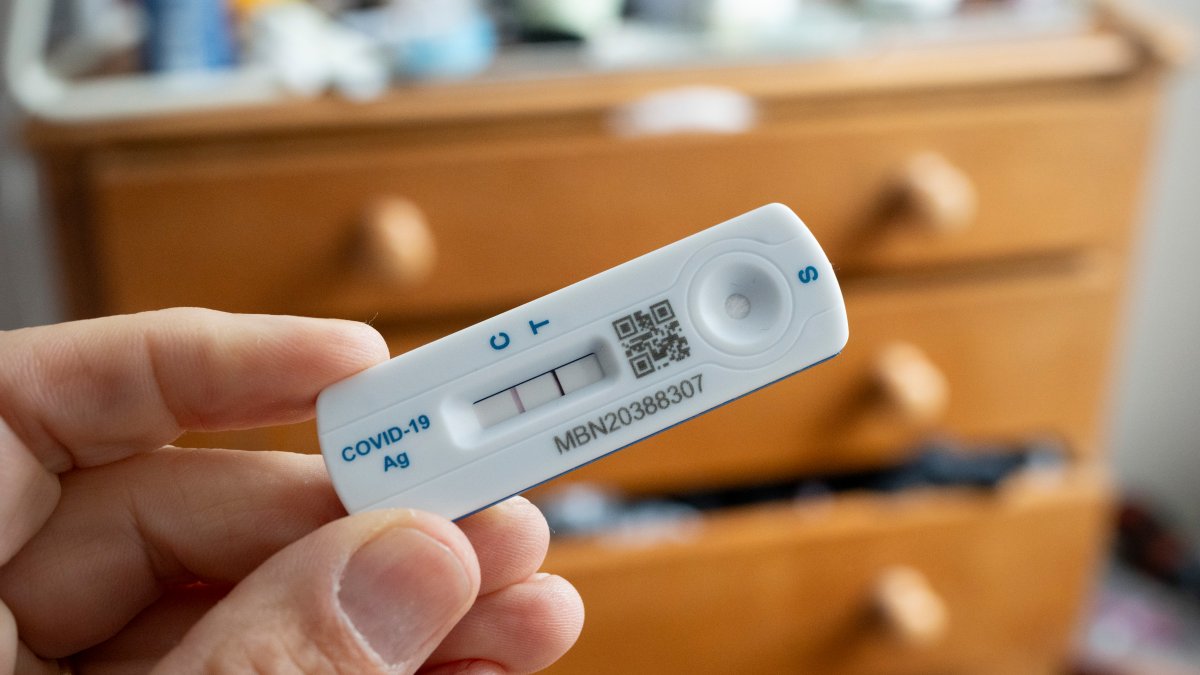COVID cases have been slowly rising in Illinois and parts of the U.S. in recent days, leaving many questioning what they should do if they test positive and what symptoms they should look for.
According to data from the CDC, test positivity in the U.S. was up this week compared to last week, with rates reaching 17.6% as opposed to 15.6%. The data was last posted on Friday and includes cases reported through Aug. 3.
While weekly case data is no longer recorded by the Illinois Department of Public Health, the CDC numbers showed Illinois was among the states with the highest test positivity rates, along with surrounding Midwest states. Emergency room visits for COVID were also up 4.1% in the same time period.
The rate still remains relatively low compared to previous surges, however.
Still, with many tests not recorded in the CDC’s metrics, knowing the exact number remains challenging.
If you contracted COVID recently, the guidelines for what you’ll need to do may be different this time around, due to significant changes initiated by the CDC earlier this year.
Here’s what to know:
What are the symptoms?
- Cough
- Sore throat
- Runny nose
- Sneezing
- Fatigue
- Headache
- Muscle aches
- Altered sense of smell
- Congestion
- Fever or chills
- Shortness of breath or difficulty breathing
- Nausea or vomiting
- Diarrhea
Recent reports have centered on specific gastrointestinal symptoms and COVID.
Dr. Katelyn Jetelina, a scientific consultant for the CDC and epidemiologist, said “gastrointestinal issues including nausea, vomiting, and diarrhea” have been previously identified as possible symptoms of COVID-19.
“We do not have specific data about the incidence of GI symptoms with the current strains of the virus, but COVID-19 symptoms can certainly differ based on the variant and the individual,” Jetelina told NBC Chicago in July.
Last year, a Chicago-area doctor said she’s noticed shifts in the most common symptoms her patients reported as the JN.1 variant rose to dominance.
Dr. Chantel Tinfang, a family medicine physician with Sengstacke Health Center at Provident Hospital of Cook County, noted at the time that many of the cases she saw reported less of the fever, body aches and chills, and presented more with sore throat, fatigue and coughing.
“We still see some patients experiencing decreased appetite, a loss of taste or smell. So it kind of depends,” she said. “One patient was just very, very tired. Like she couldn’t really do much. And that’s when you know … it’s different. It’s not just coughing and shortness of breath. We still see that though.”
She suggested consulting with your doctor if your symptoms don’t begin to improve outside of the recommended isolation period.
How long does COVID last?
As for timing, symptoms can last for several days, but in some cases, even longer.
“Some people who have been infected with the virus that causes COVID-19 can experience long-term effects from their infection, known as Long COVID or Post-COVID Conditions (PCC),” according to the CDC.
Such symptoms can last for weeks and possibly even years.
Previous timing guidelines centered around five to 10 days, however.
What to do if you test positive?
In March, the Centers for Disease Control and Prevention updated its COVID guidelines to mirror guidance for other respiratory infections. Those who contracted COVID-19 no longer need to stay away from others for five days, the CDC said, effectively nixing the five-day isolation recommendation.
People can return to work or regular activities if their symptoms are mild and improving and it’s been a day since they’ve had a fever, but the CDC still recommends those with symptoms stay home.
“The recommendations suggest returning to normal activities when, for at least 24 hours, symptoms are improving overall, and if a fever was present, it has been gone without use of a fever-reducing medication,” the guidance states.
Once activities are resumed, the CDC still recommends “additional prevention strategies” for an additional five days, including wearing a mask and keeping distance from others.
The agency is emphasizing that people should still try to prevent infections in the first place, by getting vaccinated, washing their hands, and taking steps to bring in more outdoor fresh air.
As part of the guidance, the CDC suggests:
- Staying up to date with vaccination to protect people against serious illness, hospitalization, and death. This includes flu, COVID-19, and RSV if eligible.
- Practicing good hygiene by covering coughs and sneezes, washing or sanitizing hands often, and cleaning frequently touched surfaces.
- Taking steps for cleaner air, such as bringing in more fresh outside air, purifying indoor air, or gathering outdoors.
The change comes at a time when COVID-19 is no longer the public health menace it once was. It dropped from being the nation’s third leading cause of death early in the pandemic to 10th last year.
Most people have some degree of immunity to the coronavirus from past vaccinations or from infections. And many people are not following the five-day isolation guidance anyway, some experts say.
Which variant is spreading most?
The series of COVID strains, nicknamed the “FLiRT” variants, are dominating across the U.S., according to data from the CDC. The variants, identified as KP.3.1.1, KP.3 and KP.2.3, KP.2 and more, collectively make up more than 60% of COVID cases in the U.S. the CDC’s most recent variant tracking data revealed.
These new variants, which scientists dubbed “FLiRT” after the locations of their spike protein mutations, have been circulating in the U.S. since the early spring.
Scientists are warning that the FLiRT variants may be better at evading the immune system due to their spike protein mutations, and that waning immunity and poor uptake of the latest COVID-19 vaccine have created a more susceptible population.
